Elie Dăianu was a prominent member of the Romanian elite in Transylvania in the first half of the 20th century. Although he had a rich ecclesiastical, publishing, cultural and political activity, he received little attention from historians, remaining somewhat in an undeserved shadow. Elie Dăianu was born on 9 March 1868 in the village of Cut, Alba county. His parents, Iosif Dăianu and Ana Dăianu née Munteanu, were wealthy peasants (his father was a mayor).
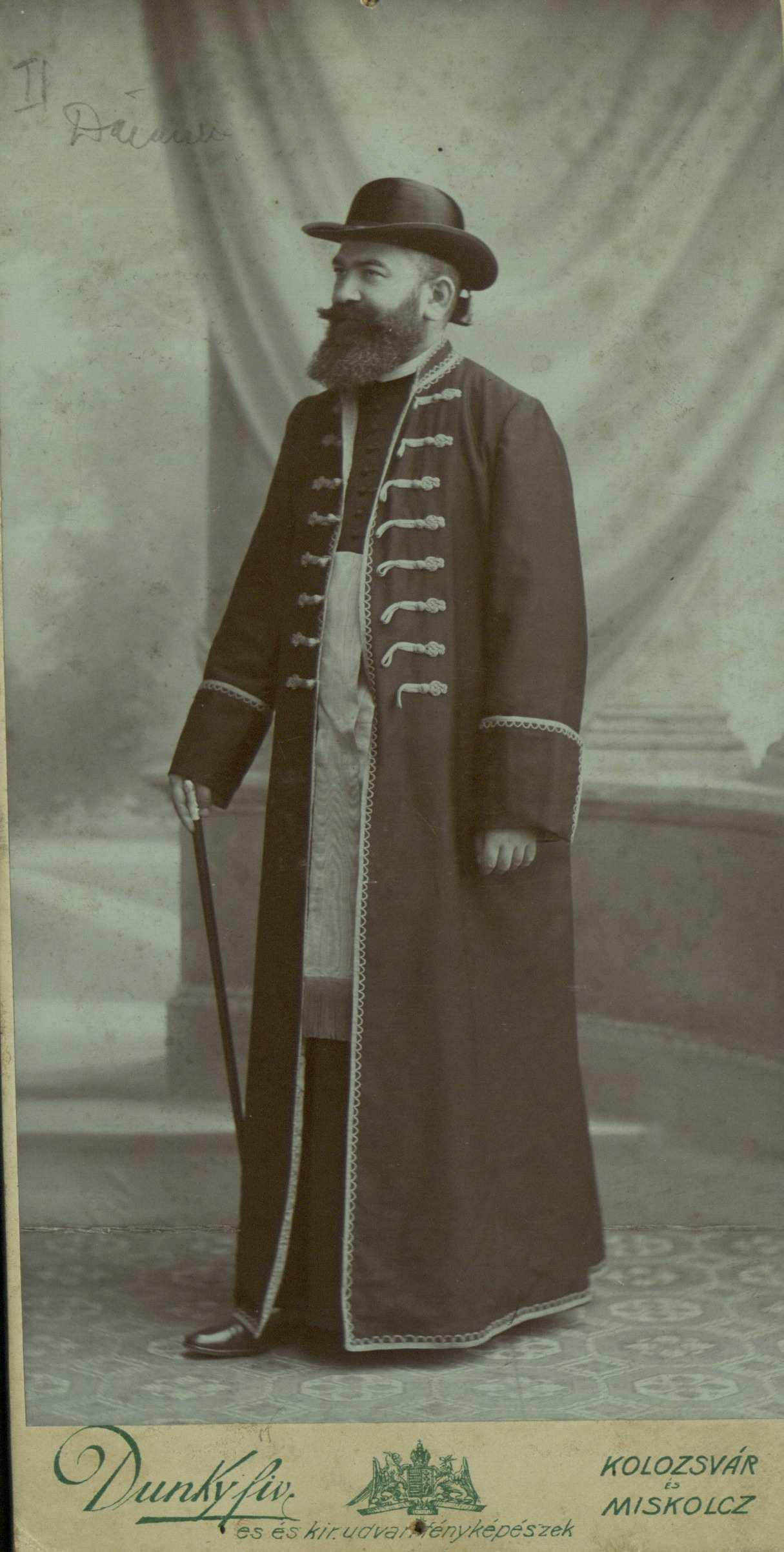 Elie Dăianu
Elie Dăianu
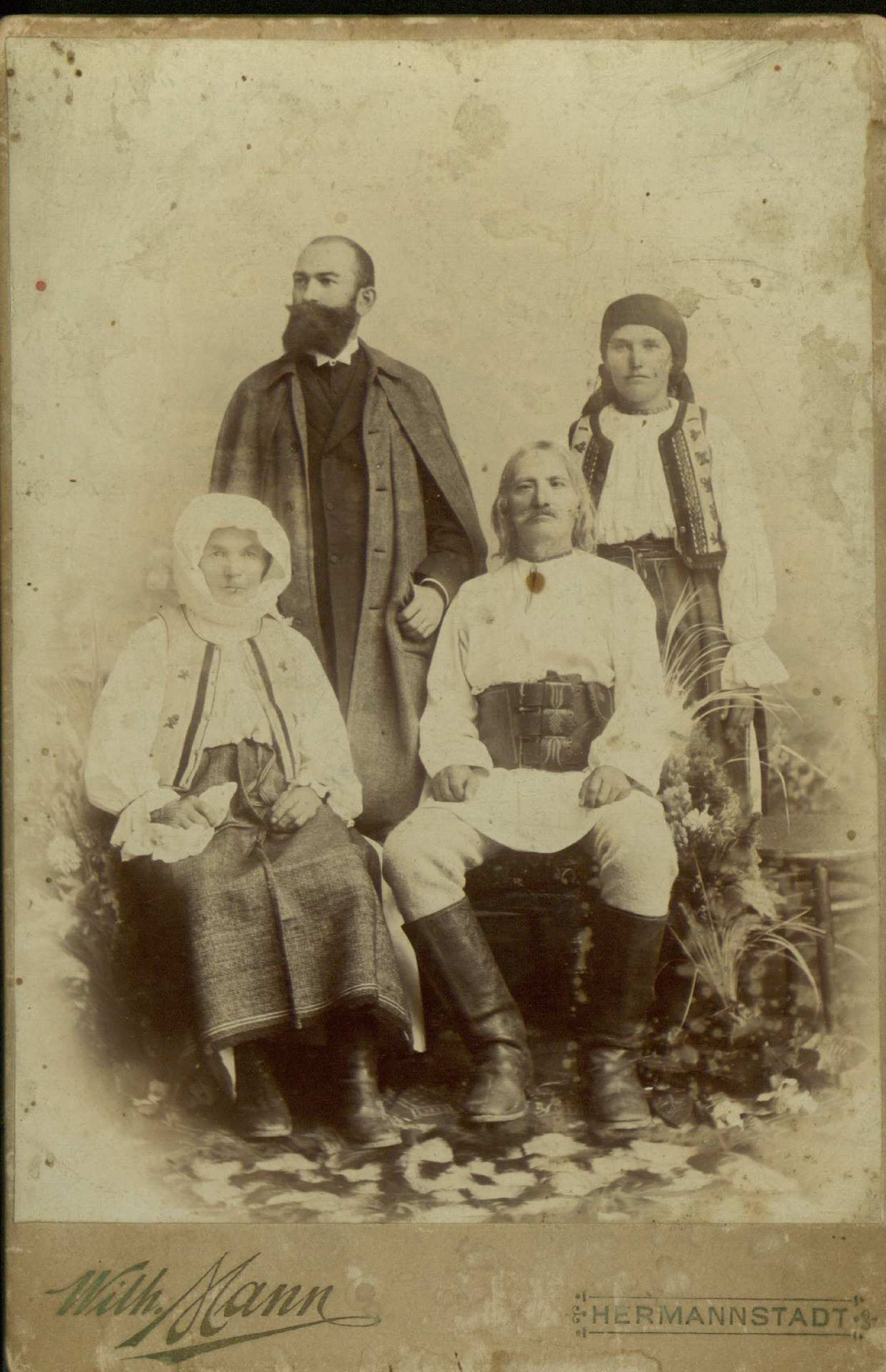
Dianu, his parents and his sister, 1890
Elie Dăianu began his studies at the village school, then continued them in Sibiu and Blaj, where he took his baccalaureate in 1888. Among his teachers in Blaj were famous Romanian scholars like Timotei Cipariu (1805–1887) and Ioan Micu Moldovan (1833–1915). Elie Dăianu then went to university in Graz and Budapest, graduating in Theology and Letters; he also obtained his doctorate in Budapest, also in Letters. Elie Dăianu was the only one of his brothers to pursue an intellectual career (he had three sisters and two brothers who remained peasants).
In 1897 Elie Dăianu married Ana Totoianu who came from a family of priests from Micești, Alba county, with whom he had two children, Ioachim Leo and Lucia Monica. Unfortunately, his wife died in 1900, shortly after the birth of his daughter (later, his son Ioachim Dăianu was to make a career as a diplomat, working in various places such as chargé d’affaires at the Romanian embassy in Riga, counsellor at the Romanian embassy in Moscow, Romanian consul general in Tirana etc.).
Elie Dăianu began his cultural and political carreer as a student. While in Budapest as a doctoral student in 1893, Dăianu was elected president of the “Petru Maior” Society, together with Iuliu Maniu (1873–1953) vice-president, Aurel Vlad (1875–1953), Octavian Beju, Octavian Vassu (1873–1935), Axente Banciu (1875–1959). In April 1894, together with Valer Moldovan (1875–1954), Ilie Cristea (1868–1939) (future Orthodox patriarch), Iuliu Maniu and Aurel Vlad, he participated in the Student Congress in Constanța, about which he wrote in the newspaper “Dreptatea”, under the pseudonym Edda; in May of the same year he was part of the press office of the Memorandum process, led by Dr. Vasile Lucaciu (1852–1922) and Septimiu Albini (1861–1919).
After finishing his studies, Elie Dăianu worked for a year (1895) as an editor at the newspaper Dreptatea in Timișoara, then, assigned by Ioan Rațiu (1828–1902), he became director of the “Tribuna” in Sibiu, which he directed between 1896 and 1900. For the next two years, until the summer of 1902, Elie Dăianu was professor of Moral and Pastoral Theology in Blaj. In August 1902 he was appointed priest and protopope of Cluj, a position he held until his retirement in 1930. At the same time, he carried out an intense cultural and political activity. In addition to articles on important current issues, he published writings and translations of literature, history, philosophy and poetry in numerous newspapers from Bucharest, Budapest, Cluj, Sibiu, Arad, Brașov etc; in 1903 he founded a new magazine in Cluj, “Răvașul”.
Elie Dăianu was an important member of the Transylvanian Association for Romanian Literature and Culture (ASTRA), founded in 1861 in Sibiu as the first central cultural institution of the Romanians of Transylvania, which played an important role in the cultural and political emancipation of the Romanian nation in Transylvania. Elie Dăianu was first a scholarship holder of ASTRA while he was a student in Blaj; later, he became involved in ASTRA’s activities, wrote educational brochures and books, held popular conferences, and even became a member of its Central Committee.
Before 1918, when Transylvania was still part of Hungary, the ideas expressed by Elie Dăianu in newspapers were considered provocative by the Hungarian authorities who sentenced him to one year in prison in Cluj and then to deportation to Sopron in Hungary. The end of the war and the union of Transylvania with Romania brought an end to Elie Dăianu’s exile.
He participated in the Great National Assembly in Alba Iulia as a delegate of the Cluj diocese; at the same time, he was the president of one of the electoral circles in Cluj that appointed delegates to this assembly. Later he joined the People’s Party, together with Octavian Goga (1888–1938) and Vasile Goldiș (1862–1934), being elected deputy in the Romanian Parliament in 1920 and vice-president of the Chamber of Deputies; the president was Duiliu Zamfirescu (1858–1922), former collaborator of his magazine “Răvașul” from Cluj. He was involved in politics until 1926, serving several terms as deputy and senator. At the same time, from 1921 to 1938, Elie Dăianu was a member of the Historical Monuments Commission - Section for Transylvania, which had the task of cataloguing and monitoring architectural and artistic monuments.
After his retirement, Elie Dăianu continued to publish articles on literature, history, theology, etc. In the last part of his life, he suffered material hardship due to the withdrawal of his pension by the communist regime on the pretext that he was a forest owner. In his later years he was supported by his son Ioachim, who was also living modestly after his diplomatic career was ended by the communist regime.
Sources:
Literature:
Valentin Orga, Din zile de detenție. Însemnările lui Elie Dăianu din anii 1917–1918, in “Revista Bistriţei”, XVII, 2003, P· 247–265.
Ilie Moise, Ilie Dăianu şi spiritul Blajului, in “Transilvania”, 5/2010, p. 73–78.
Gheorghe Naghi, Din însemnările inedite ale dr. Elie Dăianu (1917–1918), in “Ziridava”, XI, 1979, p. 1089–1097.
Robert Marcel Hart, Raluca Maria Viman, Un mare cărturar și publicist ardelean: Elie Dăianu (1868–1956), in “Caiete de Antropologie Istorică”, 2018, p. 42–50.
Press :
“Gazeta Transilvaniei” no 180/18 August 1902.
“Răvașul” no. 4/23 ianuarie 1904.
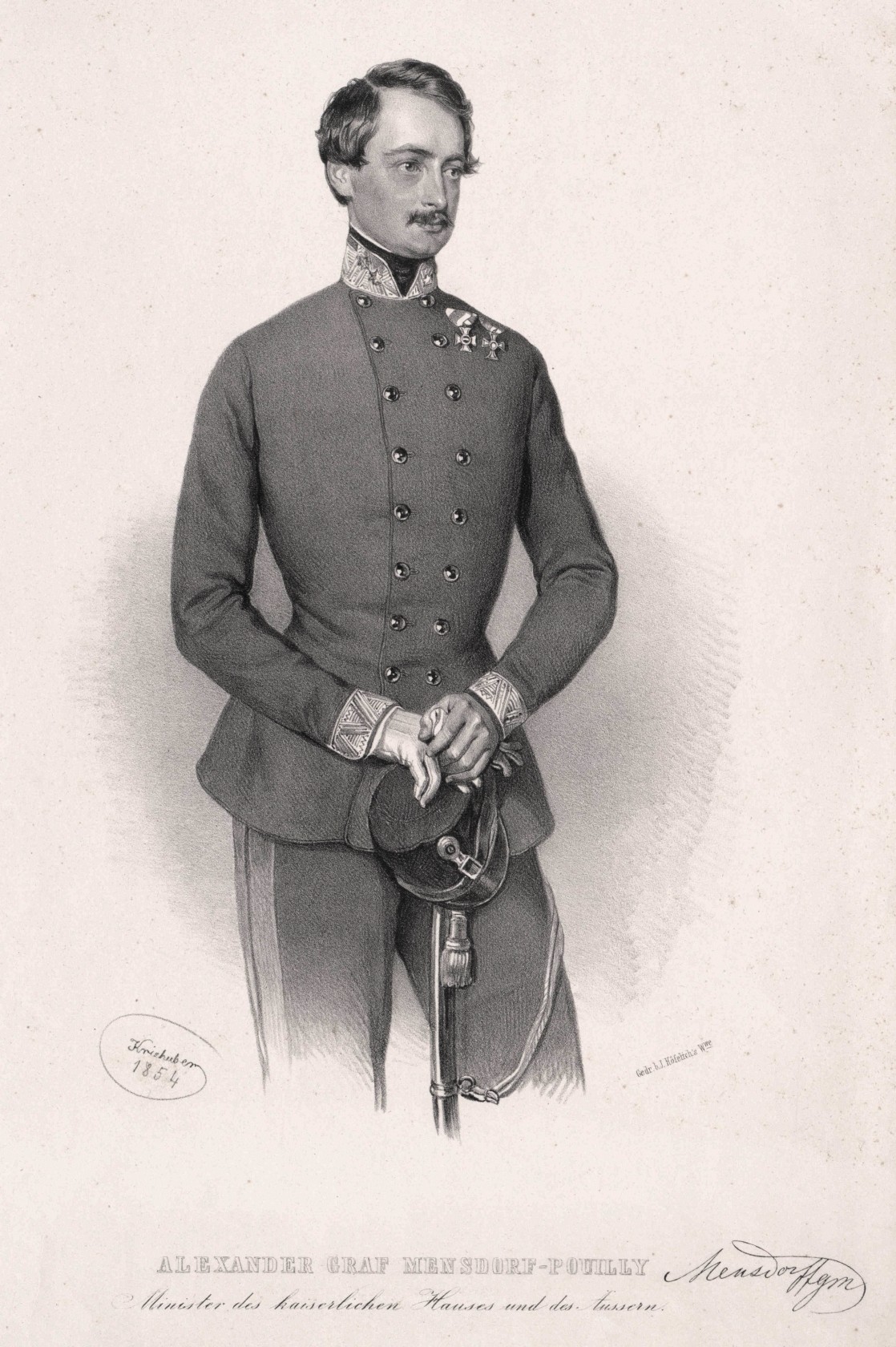 Count Alexander Mensdorff-Pouilly, graphic from the portrait collection of the Austrian National Library
Count Alexander Mensdorff-Pouilly, graphic from the portrait collection of the Austrian National Library
The life of Alexander Mensdorff-Pouilly was fundamentally different from that of other officials. He came from an old aristocratic family, the Pouilly, which left their homeland during the French Revolution. Thus, Alexander’s father Emanuel (1777–1852) had to build a position for himself in a completely different environment. He opted for a military career in the service of the Austrian Emperor and, like his brother, decided to take the name Mensdorff, which was supposed to help him to better adapt in the German-speaking world. His marriage to Princess Sophie of Saxe-Coburg-Saalfeld (1778–1835), who was of a substantially higher status, undoubtedly also helped him consolidate his position. Thanks to this marriage, Emmanuel and his descendants became related to a number of European noble families. Perhaps the most famous among his male cousins was Albert (1819–1861), husband of Queen Victoria of Britain (1819–1901), while the most famous female cousin was Queen Victoria herself. The loving union of Emmanuel and Sophie produced five sons, four of whom survived to adulthood – Hugo (1806–1847), Alphonse (1810–1894), Alexander (1813–1871) and Arthur (1817–1904). Their life trajectories show how varied the fates of 19th-century nobility could be.
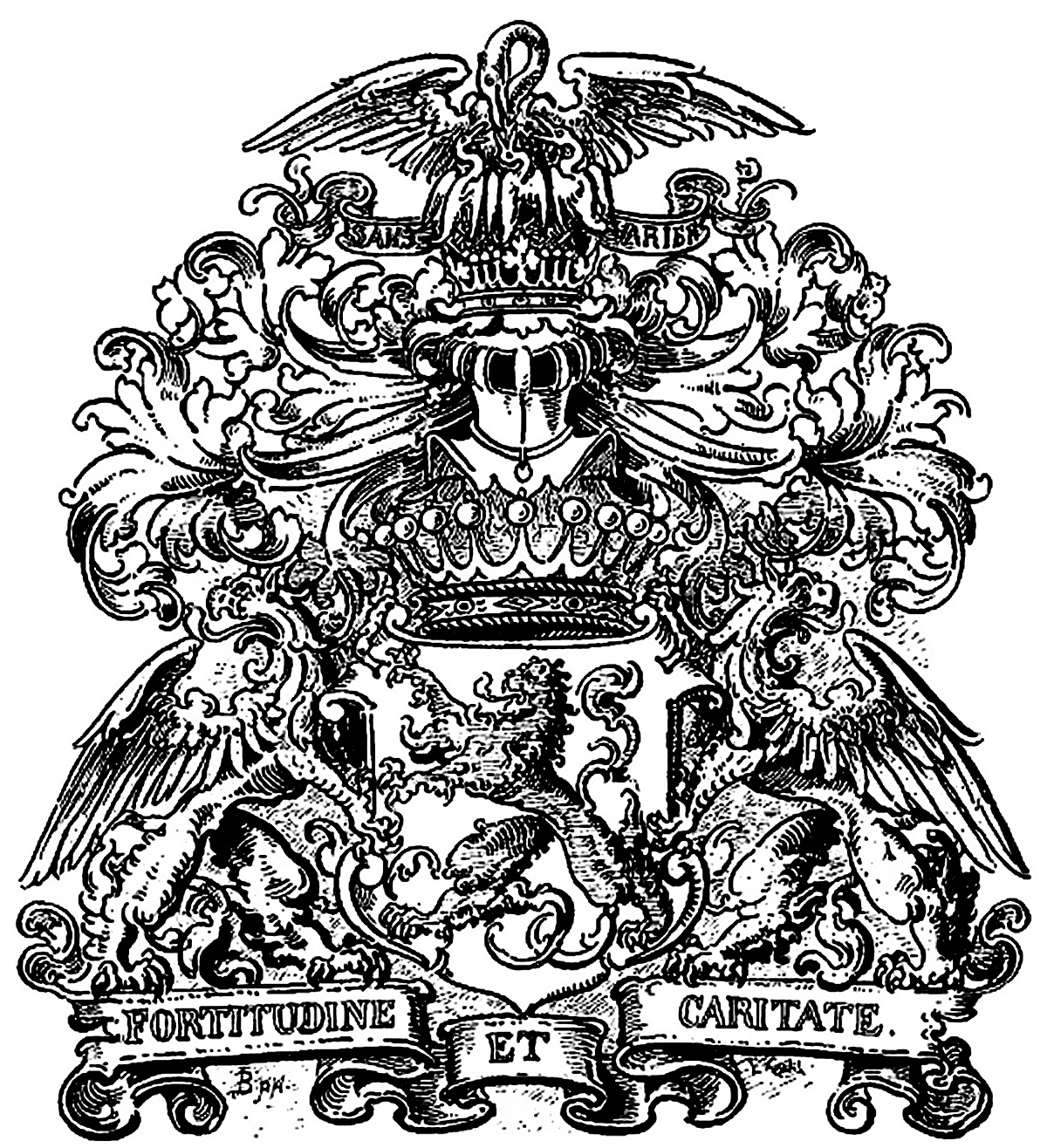 Coat of arms of the family Mensdorff Pouilly
Coat of arms of the family Mensdorff Pouilly
The eldest of the brothers, Hugo, was born in Coburg on August 24, 1806. Coburg was also the city where he grew up and received a private education. Emanuel wished to make military officers of his sons, and he succeeded. Hugo joined the army and became a cavalry officer. Although he was the eldest son and it was primarily him who was expected to ensure the continuation of the family, Hugo never married. He was no stranger to the company of women, but he did not meet a suitable partner from the upper classes. He preferred to remain alone rather than live in an unhappy marriage. During his military career, he won numerous awards and reached the rank of colonel. In 1847, however, his health began to fail. He was treated at a spa, first in Karlovy Vary (Carlsbad) and then in Jeseník (Freiwaldau), where he succumbed to laryngitis at the age of only 41.
The second-born Alphonse was born on 25 January 1810 in Coburg. His father intended a naval career for him. However, Alfonse refused and became an officer in the cavalry, where he attained the rank of colonel. A crucial issue for a man of his position was the choice of a bride. Alphonse seems to have had a lucky hand, since the woman he chose, Therese Dietrichstein (1823–1856), not only came from a good family, but there was also a mutual liking between them. The bride’s father, Franz Xaver of Dietrichstein (1774–1850), was initially not very enthusiastic about the match, hoping for a husband of a higher social position for his daughter. In the end, however, he agreed to their union. After Therese Dietrichstein became the heiress of the Moravian estate of Boskovice (Boskowitz), Alfons abandoned his military career and threw himself into the administration of the estate. For several years, during which they had four children, Alfonse and Therese lived a happy family life in Boskovice In 1856, however, tragedy struck the family – Therese died of scarlet fever. Alfonse resisted remarriage for several years, but the death of his only male heir, Arthur, in 1862, made him reconsider this decision.
His second wife was Marie, Countess of Lamberg (1833–1876), with whom he also had four children. Unfortunately, the second marriage did not last very long either, since Marie died at the age of only 42. But Alfons finally lived to see his longed-for heirs. The elder of them, Alfons Vladimír (1864–1935), later took over Boskovice. Besides taking care of the estate, Adolf also devoted himself to politics. From 1861 he sat in the Moravian Provincial Assembly in Brno and in the following year he also became a life member of the upper chamber of the Austrian Imperial Council. However, he did not see much sense in the exercise of these functions and seems to have been more comfortable with activities at a local level – in 1864–1876 he was mayor of Boskovice and in 1888 he even became its honorary citizen. Alfons died in Boskovice at the ripe age of 84 and was buried in the family tomb in Nečtiny (Preitenstein), which he had built himself.
Alexander was born on August 4, 1813 in Coburg as the third among his siblings. Like his brothers, he grew up in Coburg, where he befriended members of the most prominent European families. From a young age, however, he also felt a sense of belonging to the Austrian state and decided to serve in its army. His military career began in 1829 when he became a cadet in an infantry regiment. Over the next 20 years he rose to the rank of major general. He then entered the diplomatic service and became Austrian ambassador in St. Petersburg. However, he lasted only a year in this position and then returned to the army. At the end of the 1850s it started to become clear that if he really wanted to live up to his family duties, military service alone would not be sufficient. So he began to look around for a suitable bride. According to family correspondence, members of the Mensdorff-Pouilly family considered the mutual affection of both fiancés a necessary condition for marriage. However, Alexander seems to have given up on this requirement.
In 1857 he married Alexandrina of Dietrichstein (1824–1906), the future heiress of the large Mikulov (Nikolsburg) estate in South Moravia. The husband and wife had to find their way to each other, which was difficult at first, as they did not live together. Eventually, however, they became close and their marriage was happy. Four children were born into it, three of whom lived to adulthood – Marie (1858–1889), wife of Count Hugo Kálnoky (1844–1928), Hugo (1858–1920), heir to the estate and husband of the Russian noblewoman Olga Dolgorukova (1873–1946), and Klotylda (1867–1943), wife of Albert Apponyi (1846–1933).
In 1859 Alexander became lieutenant field marshal and two years later Governor in Lvov, where he also served as Commanding General for Galicia and Bukovina. One of the highlights of Alexander’s career was undoubtedly the year 1864, when he was appointed Austrian Foreign Minister. During his tenure, however, Austria lost the Austro-Prussian War, and Alexander was subsequently relieved from his post. At the end of his life, he served as Czech governor in Prague. It was also in Prague that he died on 14 February 1871 and was buried in the family tomb in Mikulov.
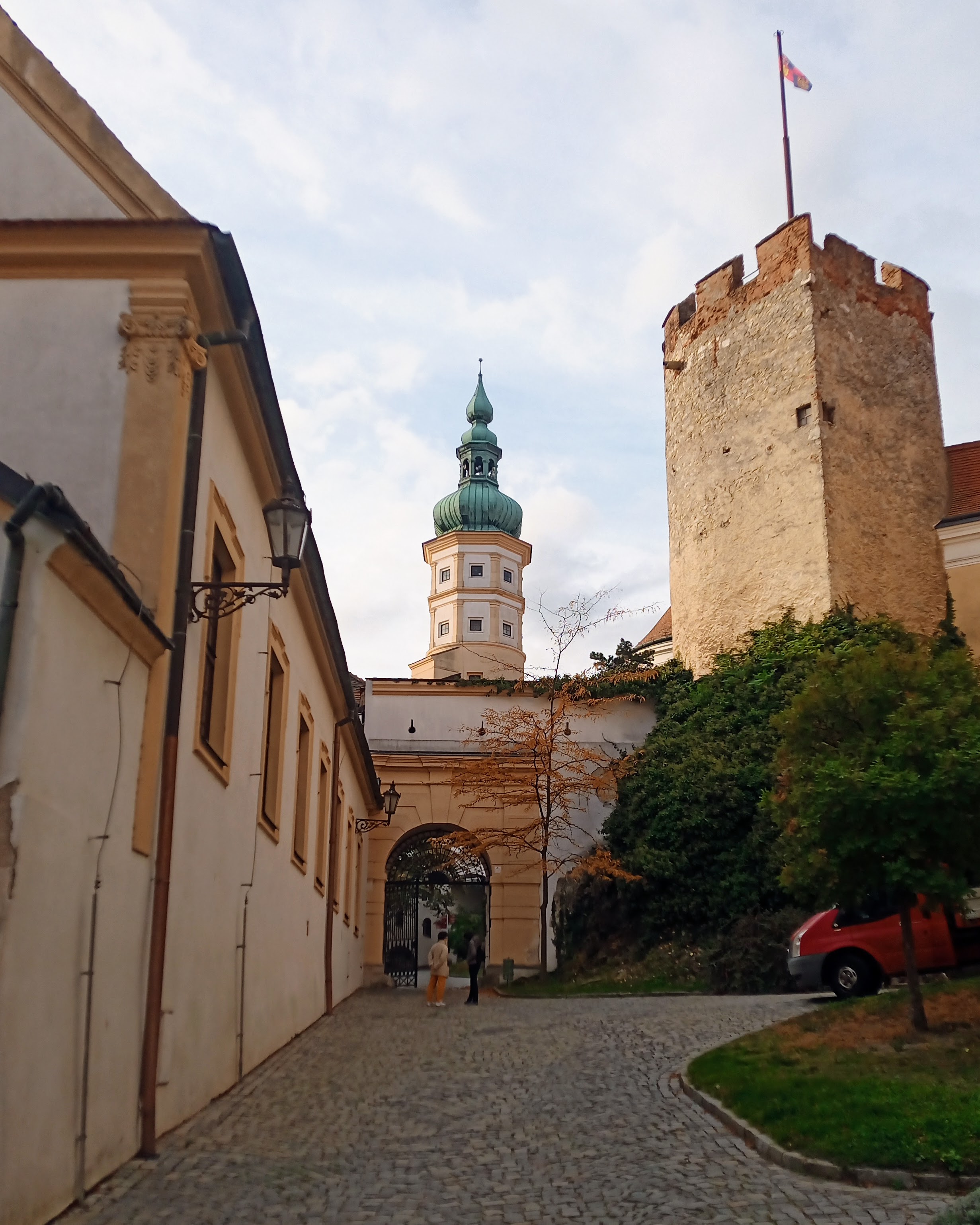 The castle in Mikulov today
The castle in Mikulov today
The youngest Arthur, like his brothers, was born in Coburg, on 19 August 1817. He too became an officer in the army and for many years served the Austrian Emperor. However, when it became clear that he would get no further than the rank of major, he decided to leave active service in 1852. Instead, he turned to business. He tried his luck in coal mining but failed. Unfortunately, the income from his lands did not cover his expenses, so he was forced to borrow frequently from his family, including Queen Victoria. Neither was he very successful in his personal life. In 1853 he married Magdalena Kremz (1835–1899), a low-born circus rider, whom he had fallen in love with. His brothers and other relatives strongly criticized him for this decision and never fully accepted Magdalena in their midst. However, they did not reject Arthur himself and continued to help him. Arthur later came to regret his choice, since Magdalena really was not a good match for him, and in 1882 they divorced. Near the end of his life, Arthur found himself a matching bride – Countess Bianca Adamovich de Csepin (1837–1912). After two years of marriage, Arthur died in Velenje, a town in what is now Slovenia.
Service in the army played an absolutely fundamental role in the lives of the four Mensdorff-Pouilly brothers. Along with their aristocratic origin, it enabled them to establish themselves socially and economically in Austrian society. The family’s marriage policy also helped them on their way to the top. It was thanks to his wife’s inheritance that Alphonse became a landowner. As for Alexander, although he himself did not participate in the running of the Mikulov estate, the profits from it allowed even him to lead an expensive life. His clerical career was rather a side effect of the military one, and his social status, abilities and character, which made him popular among the people, undoubtedly played a role in it.
Bibliography:
Švaříčková-Slabáková, Radmila: Rodinné strategie šlechty. Mensdorffové-Pouilly v 19. století. Praha: Argo, 2007.
Švaříčková-Slabáková, Radmila: Rod Mensdorff-Pouilly a boskovický velkostatek. In: Ott, Matěj, Markéta Malachová, and Roman Malach: Boskovice 1222–2022. Boskovice: město Boskovice ve spolupráci s Muzeem regionu Boskovicka, 2022.
Švaříčková-Slabáková, Radmila: Šlechtic – Příklad Huga Mensdorffa-Pouilly. In: Fasora, Lukáš, Jiří Hanuš, and Jiří Malíř. Člověk na Moravě 19. století. Brno: Centrum pro studium demokracie a kultury, 2008.
Brichtová, Dobromila: Zámek Mikulov. Mikulov: Regionální muzeum v Mikulově, 2015.
Brichtová, Dobromila: Pod tvými ochrannými křídly. Od loretánského kostela k hrobce Dietrichsteinů v Mikulově. Mikulov: Turistické informační centrum, 2014.
Steiner, Petr: Hrabě Hugo Kálnoky de Köröspatak (1844–1928). Život a osudy šlechtice na konci 19. století. Časopis Matice moravské 141/1, 2022.

